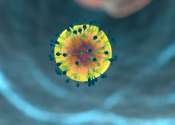New clues in fight against lethal bacteria
New research from The Australian National University (ANU) could lead to better treatment options for a rare but very lethal type of bacterial infection.
May 20, 2022
0
98
New research from The Australian National University (ANU) could lead to better treatment options for a rare but very lethal type of bacterial infection.
May 20, 2022
0
98

A team of scientists has shown that a key type of immune cell "self-renews" in humans.
Dec 17, 2020
0
177

An entirely new approach to monoclonal antibody therapy shows that targeting the more genetically stable internal protein of the SARS-CoV-2 virus rather than the surface spike protein can also clear SARS-CoV-2, reports a ...
Oct 14, 2022
0
60

Rotavirus is a major cause of diarrhea and vomiting, especially in children, that results in approximately 128,000 deaths annually. The virus triggers the disease by infecting enterocyte cells in the small intestine, but ...
Nov 20, 2020
0
56

The immune system struggles to defeat cancer or chronic infections because many of the T cells that leap into action end up "exhausted," rendering them ineffective against disease. That path to exhaustion and what triggers ...
Oct 15, 2019
0
194

Twenty years after the release of the human genome, the genetic "blueprint" of human life, an international research team, including the University of British Columbia's Chris Overall, has now mapped the first draft sequence ...
Oct 19, 2020
0
257

Scientists have determined the optimal conditions following a stem cell transplant that could control HIV without the need of an everyday pill, according to a study published today in eLife.
Jan 12, 2021
0
26

A multidisciplinary team of researchers from Duke-NUS Medical School and the Agency for Science, Technology and Research (A*STAR) in Singapore has discovered a new mitochondrial peptide called MOCCI that plays an important ...
Apr 22, 2021
0
66

Patients infected with SARS-CoV-2 develop protective immune responses, mediated by virus-specific T cells and antibodies, shortly after the infection. There is concern, however, that immunity does not persist over time, which ...
Jul 21, 2022
0
143

New research shows that maternal exposure to a common and ubiquitous form of industrial pollution can harm the immune system of offspring and that this injury is passed along to subsequent generations, weakening the body's ...
Oct 2, 2019
0
421
